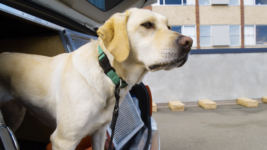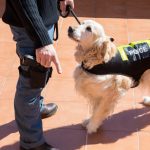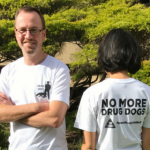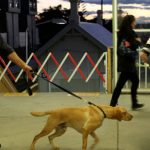Can You Trick a Drug Sniffer Dog In Order to Avoid Detection?

While laws against drug possession have been unsuccessful in stopping people from using drugs, they have led some people to become creative in the ways they avoid detection.
The use of drug detection dogs, also known as “sniffers dogs”, by police officers in New South Wales has given rise to a number of supposed fool-proof tactics for throwing these canines off the scent of your gear.
The following outlines the rules when it comes to sniffer dogs in our state, and looks at whether any of these tactics hold up to scrutiny.
Are drug detection dog operations in New South Wales legal?
A sniffer dog is a dog trained to detect minute quantities of illicit drugs in order to assist law enforcement. Most sniffer dogs in NSW are trained to detect cannabis, ecstasy (MDMA), methamphetamine and heroin.
Sniffer dog operations came into widespread use in NSW in 2002, following the passage of the Police Powers (Drug Detection Dogs) Act 2001 (NSW), which gave police the power to use sniffer dogs without any ‘reasonable suspicion’ of drug activity in places like pubs, entertainment centres and public transport stations.
Section 146 of the Law Enforcement (Powers and Responsibilities) Act 2002 (NSW) makes it explicit that NSW police are allowed to use sniffer dogs for the purposes of detecting a drug offence as long as the dog is within their custody and control.
Section 148 of the Act states that an officer can use sniffier dogs on any person at, or seeking to enter or leaving:
- Any area of premises being used for consuming alcohol where alcohol is being sold (except for places primarily used as a restaurant or other dining place);
- A public place where a sporting event, concert or other artistic performance, dance party, parade or other entertainment is being held;
- A public passenger vehicle travelling on a route, or a train station, platform or stopping place on any such route;
- Any public place in the Kings Cross precinct.
Infamously, sniffer dogs are frequently rolled out at large events in NSW, particularly at music festivals. Their presence at festivals has been shown to incentivise risky drug taking behaviour by patrons and has raised serious concerns about invasions of privacy and civil liberties given a high rate of false positives.
Can the scent of illicit drugs be masked so sniffer dogs can’t detect?
One of the commonly suggested tactics for avoiding sniffer dogs is to mask the smell of illicit drugs with anything from sunscreen to coffee grounds to meat and even deer urine.
This tactic is unlikely to be successful. Dogs possess around 300 million olfactory receptors in their noses, compared to the 6 million found within a human nose. A dog’s sense of smell is believed to be 10,000 to 1000,00 times better than human smell.
Sniffer dogs used by our state’s tend to be Labrador Retrievers who rank as one of the most intelligent and easily trained breeds in the world.
Sniffer dogs are trained to pick up the whiff of illicit drugs in the air and then to stop and inhale deeply when they get a scent. Drug detection can occur at even the most minute quantities of illicit drugs.
Whilst some of these scents, such as meat, may be enticing to the sniffer dogs they will narrow in on the scent of illicit drugs as it’s very difficult to mask this scent entirely.
Can drugs in airtight containers be detected by sniffer dogs?
Another common tactic is to try a place illicit drugs in an air tight container so that the scent of the drugs will not waft into the environment.
There are two main issues with this tactic.
Firstly, very few common types of packaging are truly “air tight” where no scent escapes. Standard plastic bags and containers are permeable and odours readily pass through.
Secondly, even if you were to purchase a high quality, odour-proof “stash bag” this does not deal with residue of illicit drugs that may be on your clothing, in your hair or on other items.
Unless you are willing to buy an expensive package designed specifically to prevent drug scent and to thoroughly decontaminate yourself, trying to trick sniffer dogs with a container is unlikely to work.
Can sniffer dogs detect drugs inside your body?
One of the more dangerous methods of trying to trick sniffer dogs is to place the illicit drugs in a protective pouch, such as a condom, and to shelve the contents into your anal canal or your vagina.
This tactic works less because it completely masks the smell of illicit drugs (there is still a chance of residue due to cross contamination), but if there is a positive sniffer dog response a police officer won’t be able to find illicit drugs on your person.
Police cannot undertake an internal search themselves, and must request the assistance of a medical practitioner. This is unlikely to happen at police checkpoints outside of airports, such as at the entrance to a music festival.
However, shelving illicit drugs carries a serious and real risk of overdose should the packaging break and the drugs leak into your system.
Being searched following a positive indication by a sniffer dog
Police can only search your person if they have a ‘reasonable suspicion’ that you have committed an offence.
A positive sniffer dog response, in itself, is not enough under the law to give rise to a reasonable suspicion.
However, police will often use a positive sniffer dog response in combination with surrounding circumstances (such as your behaviour when detected) to argue that a reasonable suspicion has been met.
When undertaking a search, police are required to:
- Conduct the least invasive kind of search practicable in the circumstances. A strip search can only be conducted in certain limited circumstances where no other search will do, and police must follow strict rules if they decide to strip search you; and
- Conduct the search in a way that provides you with reasonable privacy and as quickly as is practicable.
Police are not allowed to:
- Ask you to remove any clothing that is not necessary;
- Search any body cavities;
- Search your genital area. or breasts (for female or female identifying trans and intersex people), unless it is necessary; or
- Question you while you are being searched.
If a police officer believes you are in possession of drugs, or anything else dangerous or illegal in your mouth or hair, they are allowed to ask you to open your mouth or shake your hair.
Section 150 of the Law Enforcement (Powers and Responsibilities) Act 2002 (NSW) makes it clear that a sniffer dog should not touch you. If a sniffer dog touches you, you have the right to make an official complaint.
If you have been charged with a drug offence or your believed you have been searched unlawfully, it’s important that you receive legal advice promptly.
Can you challenge sniffer dog operations in court?
If you have been charged with an offence as a result of a sniffer dog operation, you may have options to challenge the charge in court.
This could be done on the basis that:
- The sniffer dog response was a ‘false positive’ and you did not have illicit drugs in your possession.
- The police did not have a sufficient ‘reasonable suspicion’ in order to conduct a search.
- The police did not follow correct procedure when conducting a strip search.
- The sniffer dog during the operation touched you, potentially giving rise to an unlawful assault.
- You should not have been charged with a drug-related offence (see our guide to defending against drug charges)
Defending against a drug possession offence would require establishing that either you:
- Did not have prohibited drug under your exclusive possession, custody or control; or
- Did not know that you had custody or control of a prohibited drug at the times of the offence.
In addition a number of general legal defences may also apply, depending on the circumstances of the case. These defences include duress, necessity and self-defence.
Going to court over an drug matter?
If you are you going to court over a drug-related offence, call Sydney Criminal Lawyers anytime on 9261 8881 to arrange a free first conference during which one of our experienced defence lawyers will assess the case, advise you of your options and the best way forward, and fight for the optimal outcome.





